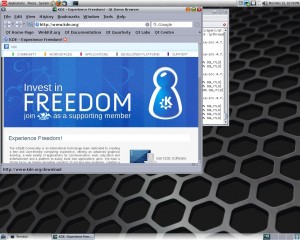Futile? Yes, but not pointless (Qt 4.7.1 on SPARC)
Monday, November 22nd, 2010I feel so conflicted. Just look at that screenshot.
I was considering starting this blog post in a mad-scientist fashion, “mad, was I? they said I was mad to try! haha! and now I shall unleash my creation upon the world and show them all! hahaha!” but I’ve probably done that before. So what you see there in the screenie is probably the first WebKit browser running on Solaris on SPARCv9 hardware. It is the demo browser from Qt 4.7.1. Compiling Qt took just under six hours, I think, but I went shopping in the meantime.
So this is ultimately futile: SPARC hardware just doesn’t get used for the desktop, does it. However, the KDE4-OpenSolaris has had requests from various folks about Qt on SPARC, built with our optimizations and with the Sun Studio compiler. So now it’s here. That is to say, it compiles and some bits run. We still need to figure out how to merge packages so that the IPS repository will spit out a suitable Qt package (either x86 or SPARC). The pkg(5) and pkg.depotd(5) programs know how to handle multiple architectures, I just don’t know how to move the files around to achieve that.
But this exercise isn’t pointless. It shows up how portable Qt is (within the X11 world, anyway). It shows that the packaging setup that the KDE4-OpenSolaris group has set up actually targets the things we said we wanted to hit (which, even after revising away Solaris 10, still includes SPARC). It might help a teensy bit with code quality to consider the warnings a different compiler throws out — although stuff like "textedit.cpp", line 154: Warning: tb hides TextEdit::tb. isn’t useful in my book.
Another thing this experiment shows is that there is more work to be done in catching CStd-based firefox plugins. The Qt demo browser cheerfully tries to load the flash plugin and then falls over because of bad library initialization (when mixing different STLs, see this post of mine for some details) if there’s any interesting media on the page. In the screenshot, we see www.kde.org, which doesn’t do anything fancy.
So there you go. One more platform Konquered (er .. it’ll take another week to get through to KDEbase).
